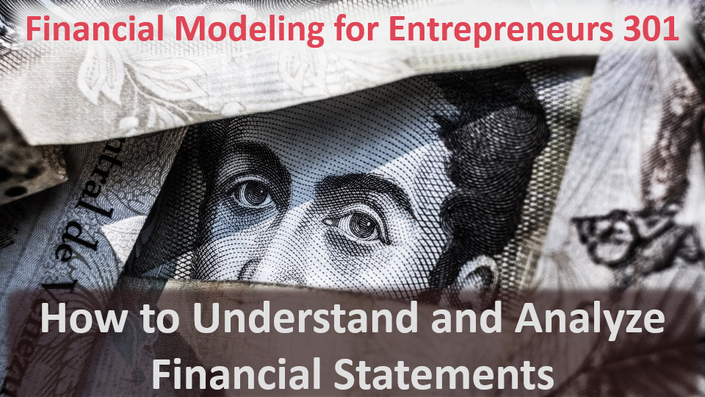
Financial Modeling for Entrepreneurs 301: How to Understand and Analyze Financial Statements (Instant Startup)
Understanding the financials is crucial to your business or technology's success. This focused course will help you nail it.
About this course
![]()
You need to speak the investors' language and you need to understand your business' financials, but you should not have to become a chartered accountant or financial analyst to do so.
Don't get tripped up by investor questions during your pitch or run out of cash because you can't interpret your financials.
This course teaches you to understand, interpret and analyze the 3 main financial statements (income statement, balance sheet and cash flow statement) with confidence.
Financial Ratios Analysis Spreadsheet
Included in the course is a Financial Ratios Analysis Spreadsheet that will automatically calculate all the relevant financial ratios for your own or someone else's business. All you need to do is enter the relevant numbers from the financial statements and the spreadsheet does the rest!
Here is a screenshot of the results:

What will I gain? What will I be able to do?
- Understand and use the core concepts and terms relevant to financial statements with confidence
- Understand and interpret the 3 main financial statements (income statement, balance sheet and cash flow statement)
- Understand and do unit economics calculations
- Analyze financial statements using vertical, horizontal and ratio analysis and understand the implications
Your Instructor

Dr. Sean Moolman has a broad range of experience stretching across chemical plant design and cost engineering, R&D (research and development), management of innovation, technology transfer, intellectual property management and entrepreneurship. He is an inventor on several international patent families.
Sean is a co-founder of PowerOptimal (Pty) Ltd, a renewable energy technology company, and has served on the boards of several other early-stage companies. Before his first start-up, Sean was the head of technology transfer (licensing & ventures) at the largest R&D institute in Africa, the CSIR in South Africa.
He has a PhD in Chemical Engineering, is a Registered Technology Transfer Professional (RTTP) with the ATTP, is a member of the Licensing Executives Society of South Africa (LES) and has completed the Management Advancement Programme at Wits Business School.
Sean regularly presents courses in financial modeling and technology & startup valuation, including for the World Intellectual Property Organization (WIPO), the Licensing Executives Society of South Africa (LES) and the Southern African Research and Innovation Management Association (SARIMA). He collaborated with the LES to develop their 3-day advanced Intellectual Property Valuation course.
Sean is passionate about innovation, entrepreneurship, reason and science, life-long learning and inspiring people!
Course Curriculum
-
Preview2aa. Origins of Accounting and Double-Entry Bookkeeping (6:25)
-
StartReference Sheet: Double-Entry Bookkeeping and the 7 Basic Types of Accounts
-
Start2a. Types of Costs: Variable, Fixed, Direct, Indirect (3:42)
-
StartReference Sheet: Types of Costs
-
Start2b. Gross vs. Net, Profit vs. Margin, Net Margin vs Net Cash Flow (6:12)
-
Start2c. Markup vs Margin (3:37)
-
StartReference Sheet: Profit, Mark-up & Margin
-
Start2d. Unit Economics: What It Is & How to Calculate It (17:48)
-
StartReference Sheet: Unit Economics Formulas and Step by Step
-
Start2e. Unit Economics Exercise - Batteries Unlimited (11:09)
-
StartTemplate: Unit Economics Calculations
-
StartQuiz on Core Concepts
-
StartAnswers to Quiz on Core Concepts
-
Start3a. The Income Statement (9:13)
-
Start3b. The Balance Sheet (8:07)
-
Start3c. The Cash Flow Statement (7:29)
-
Start3d. Financial Statements Example (2:31)
-
Start3e. Financial Statements Exercises
-
StartReference Guide: Big 3 Financial Statements
-
StartQuiz on the Big 3 Financial Statements
-
StartAnswers to Quiz on the Big 3 Financial Statements
Course duration, difficulty and background required
For an explanation of all course gradings, click here.
❓ FAQ - Frequently Asked Questions
- Video lectures
- Graded quizzes and exercises
- Course completion certificate
- Downloads:
- Reference sheets: Profit, Mark-up & Margin; Types of Costs; Unit Economics Formulas and Step by Step; Financial Statements; Ratio Analysis
- Templates: Ratio & Du Pont Analysis Spreadsheet; Unit Economics Calculation Spreadsheet
- Access to student discussions on lectures & lecturer answers to questions
- For the Coaching package: One-on-one consultation with lecturer
 This course (Financial Modeling for Entrepreneurs 301: How to Understand and Analyze Financial Statements) is the third of four courses in the Financial Modeling for Entrepreneurs Course Series.
The first three courses (courses 101 to 301) provide skills sets in 3 different areas, building up to the 4th course (course 401), where you will learn to build your own full financial model and use it to analyze your business or technology.
This course (Financial Modeling for Entrepreneurs 301: How to Understand and Analyze Financial Statements) is the third of four courses in the Financial Modeling for Entrepreneurs Course Series.
The first three courses (courses 101 to 301) provide skills sets in 3 different areas, building up to the 4th course (course 401), where you will learn to build your own full financial model and use it to analyze your business or technology.
- 2-year access to the course materials
- Work at your own pace
- Review or redo any part whenever you want to
- Pause and pick up again at any point
- Downloadable materials, quizzes and exercises reinforce the learning and provide practical tools that you can apply in your own business or activities immediately
- Assessing commercial potential of products, processes, services and business models;
- Company valuation;
- R&D and other investment decisions;
- Building budgets;
- Valuing IP (intellectual property);
- Monitoring & evaluating project or business performance.



